AUTOMATIC TRANSMISSION
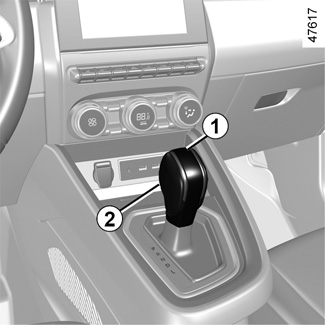
Selector lever 1
P: park
R: reverse
N: Neutral
D: automatic mode
L: “Low” mode (depending on the vehicle)
The 4 display on the instrument panel indicates the gear lever position engaged 1.
Note: press the 2 button to:
- exit position P;
- switch from position D, L or N to R or P;
- switch from position D to L.
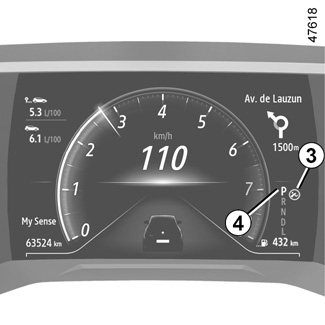
Operation
With gear lever 1 in position P, start the engine.
To move out of position P, you must depress the brake pedal before pressing the unlocking button 2.
With your foot on the brake pedal (warning light 3 disappears from the display), shift out of P position, release the locking button 2 and engage D position.
Only engage D or R when the vehicle is stopped, with your foot on the brake and the accelerator pedal released.
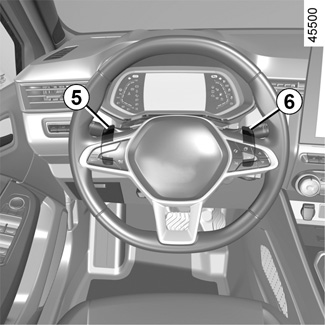
Gear changing paddles 5 and 6
Depending on the vehicle, you can use paddles 5 and 6 to change gear when the lever is in position D.
5: Change to a lower gear.
6: Change to a higher gear.
Positions P, N, L and R cannot be accessed using the paddles.
Driving in automatic mode
Put lever 1 into position D.
In most road conditions you will encounter, you will not need to touch your lever again: the gears will change automatically at the right time and at the most suitable engine speed because the automatic system takes into account the vehicle load and road contour and adjusts itself to the particular driving style you have chosen.
Economical driving
When driving, always leave the lever in position D, keeping the accelerator pedal lightly depressed to ensure automatic gear changes at a lower engine speed.
Accelerating and overtaking
Depress the accelerator pedal firmly and fully (so that it goes beyond the kickdown point).
This will enable you to change down to the optimum gear within the engine range.
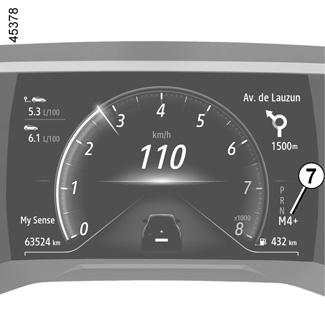
Driving in manual mode
When driving in position D you can switch to manual driving mode using paddles 5 and 6 on the steering wheel. Depending on the vehicle, two manual driving modes are available:
- a “temporary” manual mode which can be used to force a gear change by a brief press on one of the paddles. Driving mode D and the gear engaged will appear on the instrument panel.
Note: the gearbox returns to automatic mode D automatically if the gear engaged is not optimal or if the paddles have not been used for a certain length of time.
- a permanent manual mode activated by pressing and holding either of the paddles. Driving mode M and the gear engaged will appear on the 7 display on the instrument panel.
Note: return to automatic mode by pressing and holding the right-hand paddle. Automatic mode D is displayed on the instrument panel.
In all situations:
- to move down through the gears, press the left-hand paddle;
- to move up through the gears, press the right-hand paddle.
Note: depending on the display, the + and - or and indicators will suggest moving up or down a gear.
Special cases
In certain driving conditions (resulting in, for example, engine protection, operation of the Electronic Stability Control programme: ESC etc.) the automated system may change the gear automatically.
Likewise, to prevent incorrect manoeuvres, a gear change may be refused by the automatic system: in this case the gear display flashes for a few seconds as a warning.
When facing uphill, to remain stopped, do not keep your foot on the accelerator.
Risk of overheating the automatic gearbox.
Check that the indicator light P on the instrument panel is activated before leaving the vehicle.
Risk of loss of immobilisation of the vehicle.
Special circumstances
If the road type or weather conditions (steep uphill slopes, sudden downhill slopes, deep snow, sand or mud) make it difficult to stay in automatic mode, depending on the vehicle, it is advisable:
- on vehicles equipped with steering wheel paddles: switch to manual mode using the paddles. This will prevent the automatic gearbox from changing gears repeatedly when climbing, and permit engine braking on long descents.
- on vehicles not equipped with steering wheel paddles: use “Low” mode to enable, at low speed below 31 mph (50 km/h), driving on surfaces with low grip (snow, mud, etc.), climbing a slope or engine braking during a hill descent. To do this, set the lever to position L.
Note: in “Low” mode, the variations in engine speed are continuous and the accelerations are more linear.
To avoid the engine stalling in very cold weather, wait a few seconds before disengaging position P or N and engaging the lever in position D, R or L.
Parking the vehicle
When the vehicle is stopped, move the lever to position P while keeping your foot on the brake pedal: the gearbox is in neutral and the drive wheels are mechanically locked by the driveshaft.
Ensure that the electronic parking brake is engaged.
Maintenance period
Refer to the maintenance document for your vehicle or consult an Approved Dealer to check whether the automatic gearbox requires scheduled maintenance.
If it does not need to be serviced, there is no need to top up the oil.
Operating faults
- when driving, if the message “WARNING: Check Gearbox” appears on the instrument panel, it indicates a failure.
Contact your approved Dealer as soon as possible;
- when driving, if the message “WARNING: Gearbox Overheating” appears on the instrument panel, stop as soon as possible to let the gearbox cool down and wait for the message to disappear;
- troubleshooting on a vehicle with an automatic gearbox TOWING: breakdown recovery.
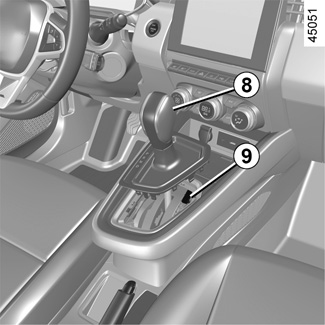
When setting off, if the lever is stuck in P when you press the brake pedal (e.g. battery fault), it is possible to manually release the lever to unblock the drive wheels. To do this, unclip the base of the gaiter and press the 9 push button while simultaneously pressing the 8 button on the lever to unlock the lever and shift to position N.
Contact an authorised dealer as soon as possible.
P position must only be engaged when the vehicle is stationary.
For safety reasons, do not switch off the ignition before the vehicle has come to a complete standstill.
An impact to the underside of the vehicle while manoeuvring (e.g. striking a post, raised kerb or other street furniture) may result in damage to the vehicle (e.g. deformation of an axle).
To avoid any risk of accident, have your vehicle checked by an approved Dealer.